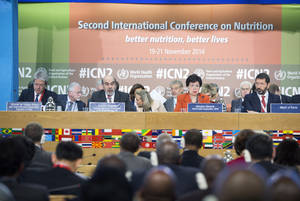Forgive me if I sound cynical but I have just been reading one of the latest press releases from the World Health Organisation.
It kicks off “Ministers and senior officials responsible for health, food or agriculture and other aspects of nutrition adopted the Rome Declaration on Nutrition, and a Framework for Action, which set out recommendations for policies and programmes to address nutrition across multiple sectors”. Which is described as “a major step towards eradicating malnutrition worldwide”.
But is it?
I don’t think anyone in their right minds would consider either malnutrition or obesity as one of the great health threats of our day but do WHO’s proposals actually cut the mustard?
They say “The Rome Declaration on Nutrition enshrines the right of everyone to have access to safe, sufficient and nutritious food, and commits governments to preventing malnutrition in all its forms, including hunger, micronutrient deficiencies and obesity.
The Framework for Action recognizes that governments have the primary role and responsibility for addressing nutrition issues and challenges, in dialogue with a wide range of stakeholders-including civil society, the private sector and affected communities. Building on the Declaration’s commitments, goals and targets.”
Which is great in principle but how do they plan to deliver?
From what I can see the core actions are as follows:-
“In order to provide universal access to healthy diets, governments should encourage a reduction in trans fats, saturated fats, sugars and salt in foods and drinks, and improve the nutrient content of foods through regulatory and voluntary instruments. ”
“Governments are urged to educate and inform their citizens about healthier eating practices, and also to introduce social protection measures, such as school-feeding programmes, to provide nutritious diets to the most vulnerable. ”
“Promoting and supporting exclusive breastfeeding for six months, and continued breastfeeding until age two or beyond.”
“To strengthen local food production and processing, especially by smallholder and family farmers, giving special attention to the empowerment of women.”
All of which sound great but I still don’t know how or even if they would work. What do you think? Please share your thoughts in the comments section below.
Thanks in advance.
PS If there is anyone from WHO reading this please feel free to tell us in more detail who these will really be put into action.
